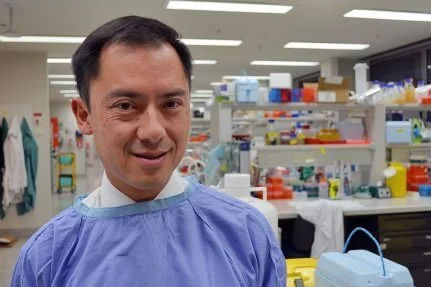New trial aimed at keeping people with AML in remission
Professor Andrew Wei instigated and is leading the INTERCEPT (AMLM26) platform trial
A new platform trial, a world first, could have transformative implications for people with resistant acute myeloid leukaemia (AML).
INTERCEPT (AMLM26) is the name of the national trial, instigated and led by Professor Andrew Wei, head of the AML program at the Alfred Hospital (Melbourne), in collaboration with the Australasian Leukaemia & Lymphoma Group (ALLG) and the MD Anderson Cancer Centre, the largest cancer centre in the U.S.
This trial is being run through the ALLG, with seed funding* of $280,000 from the Leukaemia Foundation over two years, to help get this project up and running.
Dr Wei’s goal is to provide a suite of novel therapies to target leukaemia in the earliest stages of disease progression, prior to the patient relapsing, with the goal of keeping the patient in remission for longer.
This trial is a big step in that direction. It is based on an innovative study design and could change the way AML research is conducted.
Dr Wei said INTERCEPT is a national program to detect rising minimal residual disease (MRD) for people in remission, using new highly sensitive molecular technologies.
“We have the technology now to detect relapsing disease earlier, but we haven’t had the trial to do anything about it,” said Dr Wei.
“From a patient point of view this could allow patients to remain well while having their disease treated.”
“The aim is to keep people in remission and treat them before they relapse and before the onset of life-threatening symptoms.”
Delaine Smith, CEO of the ALLG said, “the AMLM26 INTERCEPT trial offers a profound opportunity for rapid advancement in knowledge of the disease biology of AML through testing genetic mutations and matching medicines”.
“The ALLG, through its national membership, is proud to bring new clinical trial opportunities to patients like AMLM26 INTERCEPT which aims to improve survival,” she said.
Dr Wei is confident, “there will be some extraordinary outcomes from this study”.
“These treatments will be offered to sites around the country via the ALLG network of treatment centres.
“This is a home-grown study – perhaps the most complex trial that the ALLG has ever done in AML,” said Dr Wei.
“We’re planning to have 300 patients over the next 3-4 years – that’s 300 new options for patients.
“The beauty of this trial is that if a patient does not respond or loses response to one treatment, we have the potential to offer an alternative treatment,” he said.
“This is because the trial will offer six or more options simultaneously when fully operational.
“So, rather than having a patient go from one hospital or city to the next, looking for a new treatment, they can stay in the one place and get it all under the one roof – that’s why it’s so different.”
It’s a platform trial, so the treatment is adapted to the individual over the course of the study.
“As time goes on and as drugs are developed, they’ll be brought into the one trial, instead of having a single trial for every different drug, which is complicated for patients.”
Right now, Dr Wei said, “there’s a lack of highly effective options for relapsed patients with AML. We need to turn the tide against AML and try and attack it much earlier than we currently do”.

